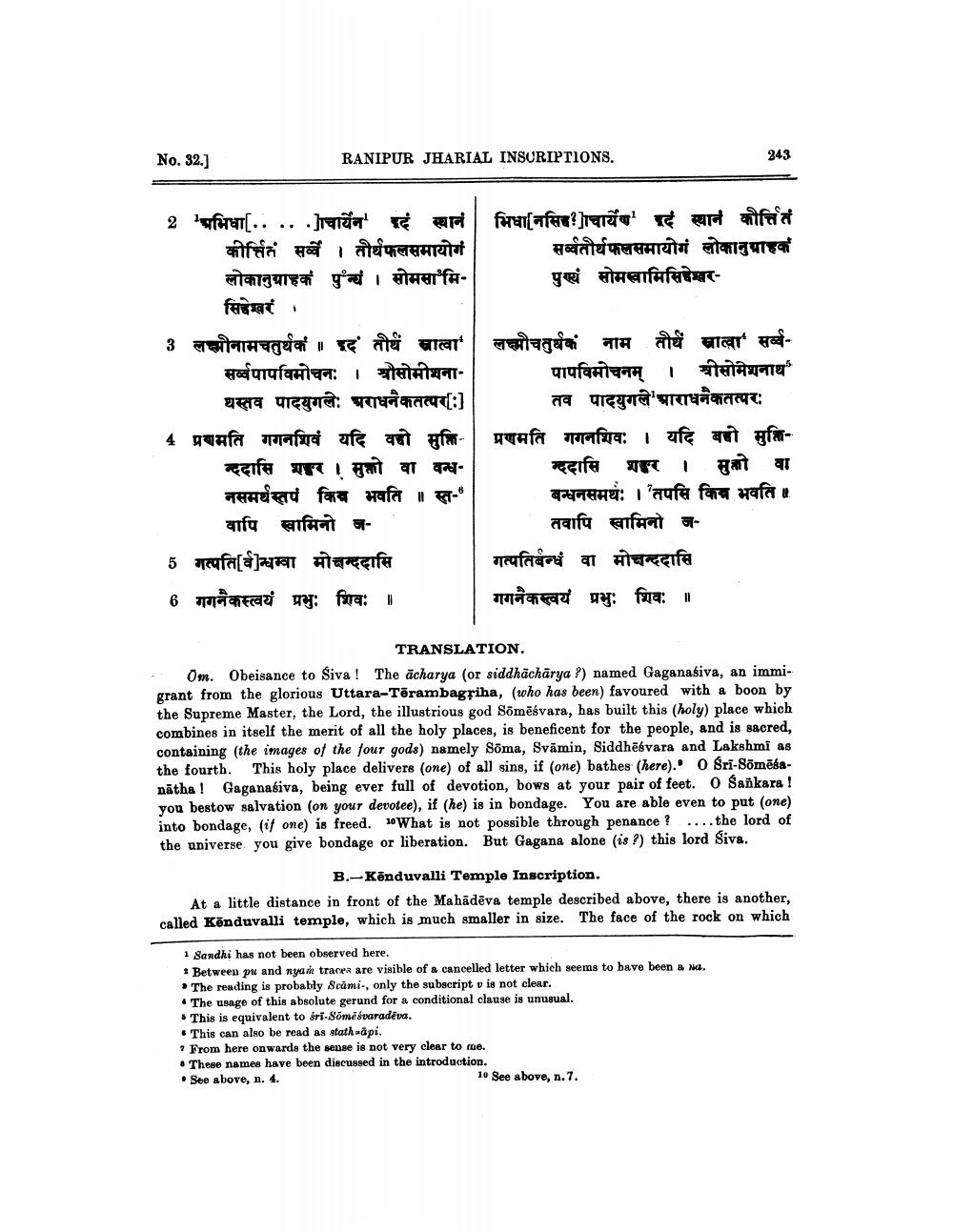________________
No. 32.]
RANIPUR JHARIAL INSURIPTIONS.
243
2 'अभिधा[.. .. .]चार्येन' इदं स्थानं | भिधानिसिक]चार्येण इदं स्थान कौर्तित
कीर्तितं सर्वे । तीर्थफलसमायोग सर्वतीर्थफलसमायोगं लोकानुग्राहक लोकानुग्राहक पुन्छ । सोमसा मि
पुण्यं सोमवामिसिद्देश्वरसिद्देश्वरं ।
लक्ष्मीचतुर्थकं नाम तीर्थं सात्वा सर्वसर्वपापविमोचनः । श्रोसोमीशना- पापविमोचनम् । श्रीसोमेशनाथ
थस्तव पादयुगले: अराधनकतत्परः] तव पादयुगले'पाराधनकतत्परः 4 प्रणमति गगनशिवं यदि वहो मुक्ति- | प्रणमति गगनशिवः । यदि बहो मुक्तिन्ददासि शहर । मुक्तो वा वन्ध
न्ददासि शहर । मुत्तो वा नसमर्थस्त किन भवति ॥ स्त
बन्धनसमर्थः । 'तपसि किन भवति। वापि खामिनो ज
तवापि स्वामिनो ज5 गत्पतिवन्धवा मोक्षन्ददासि
गत्पतिबन्धं वा मोचन्ददासि 6 गगनैकस्त्वयं प्रभुः शिवः ॥ गगनैकस्त्वयं प्रभुः शिवः ॥
__TRANSLATION. Om. Obeisance to Siva! The acharya (or siddhächārya ?) named Gaganasiva, an immigrant from the glorious Uttara-Tērambagriha, (who has been) favoured with a boon by the Supreme Master, the Lord, the illustrious god Sömēsvara, has built this (holy place which combines in itself the merit of all the holy places, is beneficent for the people, and is sacred, containing (the images of the four gods) namely Soma, Svāmin, Siddhesvara and Lakshmi as the fourth. This holy place delivers (one) of all sins, if (one) bathes (here). O Sri-Sõmēbanātha ! Gaganagiva, being ever full of devotion, bows at your pair of feet. O Sankara ! you bestow salvation (on your devotee), if (he) is in bondage. You are able even to put (one) into bondage, (if one) is freed. What is not possible through penance ? ....the lord of the universe. you give bondage or liberation. But Gagana alone (is?) this lord siva.
B.-Könduvalli Temple Inscription. At a little distance in front of the Mahādēva temple described above, there is another, called Kēnduvalli temple, which is much smaller in size. The face of the rock on which
1Sandhi has not been observed here. • Between pu and nyan tracer are visible of a cancelled letter which seems to bave been a na.
The reading is probably Scami, only the subscript v is not clear. • The usage of this absolute gerund for a conditional clause is unusual. . This is equivalent to sri-Sömēsvaradeva. • This can also be read as stath-api.
From here onwards the sense is not very clear to me. . These names have been discussed in the introduction. • See above, n. 4.
10 See above, n.7.




